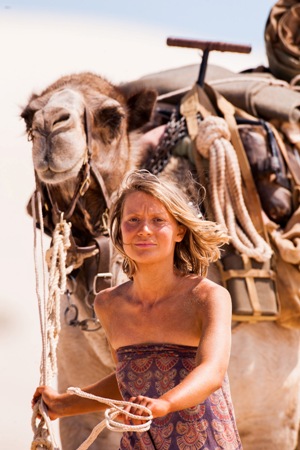The Australian Outback exerts a powerful pull on the imagination. It is both an promise and a threat: With the former, the endless vistas support the notion that we can only be held back by the limits of our imagination and ambition. But one might just as easily be undone by the same; do we have the emotional and intellectual resilience to contend with the seemingly limitless expanses, metaphorical and literal, of time and space?
In 1977, a young Australian woman called Robyn Davidson started a trek across the Australian Outback, 1,700 miles, alone aside from her Labrador Diggity and four wild camels she tamed to carry her possessions along the way. The trek took 8 months, and captured the public imagination to an unanticipated degree; people called her the Camel Lady, half admiringly, half wonderingly. Partially sponsored by National Geographic, the article that she wrote for them in return – along with photographs taken along the way by the photographer Rick Smolan – cemented her place amongst the first rank of adventurers.

Afterwards, she moved to London and spent 3 years in Doris Lessing’s basement, writing a book about her experiences. That book, Tracks, has just been adapted into a film of the same name. Currently screening as part of the Australian Film Festival, Tracks is both an excellent film and an excellent synopsis of what we’ve internalised as the essentials of the Australian character: a self confidence bordering on brashness at times, informality but not simplicity, a refusal to stand to attention to the rigidity of hierarchies, but respect (or at least curiosity) for the traditions of others.
Robyn – played with a beguiling freshness by the ingenue-like Mia Wasikowska – pitches up in Alice Springs, with her dog and a plan. Work to save some money, learn about taming wild camels, then trek across the outback up to the Indian Ocean. Why? Her father had done something similar, across the Kalahari. But it doesn’t quite seem reason enough. We identify hints of darkness in her past, but nothing tangible.
In any case, even the simplest of plans run the risk of unravelling from the start. Work was hard to come by, the camel-farmer who was to give her a couple of the beasts in return for a half-year of unpaid labour ripped her off. But at the edge of despair, she meets a third generation Afghan-Australian called Sallay, a rancher who does give her a couple of camels and invaluable advice (aside from the obvious “you’re crazy”, which she ignored). When friends come to visit, she’s introduced to photographer Rick (Adam Driver), bespectacled, intense and a bit of a know-it-all. He’d love photograph her trip; she’d rather he didn’t, because she wants to be alone. He has contacts at the National Geographic, who would happily sponsor the trek in return for first dibs on her story; the money will be helpful, she knows, so she reluctantly agrees to what soon begins to feel like a Faustian pact.
Tracks is defined principally by Mandy Walker’s lucid, eloquent cinematography. The desert becomes alive through her lens; it seduces Robyn then disposes of her, toys with her emotions and leads her to the very edge of despair. The Moon is a harsh mistress, they say; if so, then the Outback a cruel and capricious master. It is never so much a question of whether Davidson will complete her epic trek, but whether she will survive.
I think part of the attraction of Tracks, the book, lay in the story of a woman who defined her destiny on her own terms. The adaptation loses this slightly. The move from a not-entirely-benign hostility to emotional rapprochement between Robyn and Rick doesn’t feel forced in the context of the film, but it is perhaps a bit of a distraction. That said, companionship during her 8 months in the wild becomes a very scarce commodity. She seeks, and is given, help along the way from Aborigines, and learns to respect their struggle for self determination. Her dog and her camels become the emotional anchor that secure her, particularly at moments where her fragility threatens to overwhelm her, leaving her blowing aimlessly across the expanses of the Outback like tumbleweeds.
It would have been brave, but perhaps a risk too much, for Tracks to simply accept the absence of a specific reason for Robyn’s epic trek. Still the dichotomy that the film introduces, between alone-ness and loneliness, is subtle and convincing, if perhaps a little tainted with after-the-fact rationalisation. Even so it complements, rather than distracts from, a bold and beautiful film. Ultimately. we can understand why Robyn craves the right to be alone. But whether she has the strength to withstand the alone-ness that comes with it, remains to be seen.
Tracks (2013)
Directed by John Curran, Screenplay by Marion Nelson and based on Robyn Davidson’s book
Starring Mia Wasikowska, Adam Driver
112 minutes, English and Pitjantjatjara, with Hebrew subtitles





